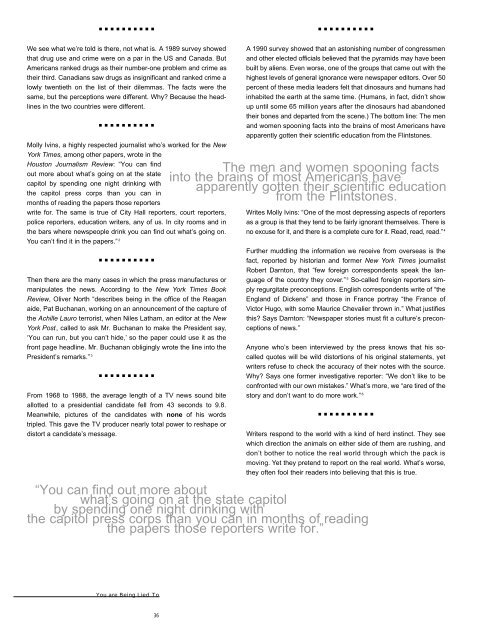otherwise
you are being lied to
you are being lied to
You also want an ePaper? Increase the reach of your titles
YUMPU automatically turns print PDFs into web optimized ePapers that Google loves.
We see what we’re told is there, not what is. A 1989 survey showed<br />
that drug use and crime were on a par in the US and Canada. But<br />
Americans ranked drugs as their number-one problem and crime as<br />
their third. Canadians saw drugs as insignificant and ranked crime a<br />
lowly twentieth on the list of their dilemmas. The facts were the<br />
same, but the perceptions were different. Why? Because the headlines<br />
in the two countries were different.<br />
<br />
Molly Ivins, a highly respected journalist who’s worked for the New<br />
York Times, among other papers, wrote in the<br />
Houston Journalism Review: “You can find<br />
out more about what’s going on at the state<br />
capitol by spending one night drinking with<br />
the capitol press corps than you can in<br />
months of reading the papers those reporters<br />
write for. The same is true of City Hall reporters, court reporters,<br />
police reporters, education writers, any of us. In city rooms and in<br />
the bars where newspeople drink you can find out what’s going on.<br />
You can’t find it in the papers.” 2<br />
<br />
Then there are the many cases in which the press manufactures or<br />
manipulates the news. According to the New York Times Book<br />
Review, Oliver North “describes being in the office of the Reagan<br />
aide, Pat Buchanan, working on an announcement of the capture of<br />
the Achille Lauro terrorist, when Niles Latham, an editor at the New<br />
York Post, called to ask Mr. Buchanan to make the President say,<br />
‘You can run, but you can’t hide,’ so the paper could use it as the<br />
front page headline. Mr. Buchanan obligingly wrote the line into the<br />
President’s remarks.” 3<br />
<br />
From 1968 to 1988, the average length of a TV news sound bite<br />
allotted to a presidential candidate fell from 43 seconds to 9.8.<br />
Meanwhile, pictures of the candidates with none of his words<br />
tripled. This gave the TV producer nearly total power to reshape or<br />
distort a candidate’s message.<br />
A 1990 survey showed that an astonishing number of congressmen<br />
and other elected officials believed that the pyramids may have been<br />
built by aliens. Even worse, one of the groups that came out with the<br />
highest levels of general ignorance were newspaper editors. Over 50<br />
percent of these media leaders felt that dinosaurs and humans had<br />
inhabited the earth at the same time. (Humans, in fact, didn’t show<br />
up until some 65 million years after the dinosaurs had abandoned<br />
their bones and departed from the scene.) The bottom line: The men<br />
and women spooning facts into the brains of most Americans have<br />
apparently gotten their scientific education from the Flintstones.<br />
The men and women spooning facts<br />
into the brains of most Americans have<br />
apparently gotten their scientific education<br />
from the Flintstones.<br />
Writes Molly Ivins: “One of the most depressing aspects of reporters<br />
as a group is that they tend to be fairly ignorant themselves. There is<br />
no excuse for it, and there is a complete cure for it. Read, read, read.” 4<br />
Further muddling the information we receive from overseas is the<br />
fact, reported by historian and former New York Times journalist<br />
Robert Darnton, that “few foreign correspondents speak the language<br />
of the country they cover.” 5 So-called foreign reporters simply<br />
regurgitate preconceptions. English correspondents write of “the<br />
England of Dickens” and those in France portray “the France of<br />
Victor Hugo, with some Maurice Chevalier thrown in.” What justifies<br />
this? Says Darnton: “Newspaper stories must fit a culture’s preconceptions<br />
of news.”<br />
Anyone who’s been interviewed by the press knows that his socalled<br />
quotes will be wild distortions of his original statements, yet<br />
writers refuse to check the accuracy of their notes with the source.<br />
Why? Says one former investigative reporter: “We don’t like to be<br />
confronted with our own mistakes.” What’s more, we “are tired of the<br />
story and don’t want to do more work.” 6<br />
<br />
Writers respond to the world with a kind of herd instinct. They see<br />
which direction the animals on either side of them are rushing, and<br />
don’t bother to notice the real world through which the pack is<br />
m o v i n g . Yet they pretend to report on the real world. What’s worse,<br />
they often fool their readers into believing that this is true.<br />
“You can find out more about<br />
what’s going on at the state capitol<br />
by spending one night drinking with<br />
the capitol press corps than you can in months of reading<br />
the papers those reporters write for.”<br />
You are Being Lied To<br />
36


